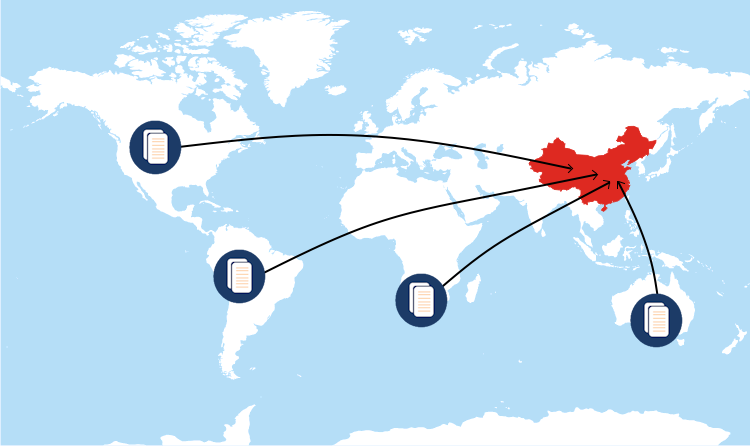Contents
Introduction
On March 8, 2022, China officially acceded to the Convention Abolishing the Requirement of Legalisation for Foreign Public Documents, also known as the “Hague Apostille Convention.” The Apostille Convention will officially go into effect in China on November 7, 2023.
The Convention was adopted by the Hague Conference on Private International Law (HCCH) in 1961, and it has since been ratified by over 120 countries and territories worldwide, including Hong Kong and Macao, the United States, the Philippines, United Kingdom, and Australia.
For a complete list of countries and territories that are party to the Convention, see the HCCH | #12 – Status table.
For countries that are not party to the Apostille Convention, the current authentication process will remain in place. This includes Canada (for which the Convention will enter into force on Jan. 11, 2024), Rwanda (for which the Convention will enter into force on June 5, 2024), Thailand, and Vietnam.
Note that India has objected to China joining the Convention, so apostilles issued in India cannot be used in China, and vice-versa.
Note that documents issued in Mainland China for use in Hong Kong or Macau, or vice versa, will not need to be apostilled. Legalization of documents between these territories will continue to rely on the current mechanisms (e.g. attestation by a China-appointed attesting officer). See HCCH | Declaration/reservation/notification.
What Is an Apostille?
Generally speaking, in international legal proceedings, when a document from one country is going to be used in another country, “legalization” is the process of proving the authenticity of the signatures, stamps, and seals that appear on the document.
Previously, the type of legalization required if the document was issued in China or to be used in China was “consular authentication“ (领事认证), meaning that a document issued in China had to be legalized by a foreign embassy or consulate in China, and that a document issued abroad had to be legalized by a PRC embassy or consulate in the country where the document was issued.

China’s Ministry of Foreign Affairs has already shared a sample apostille:

The purpose of the Apostille Convention is to make the procedure for legalizing documents from one country for use in another country easier and faster. Under the Convention, an embassy or consulate no longer needs to be involved in the legalization process. Instead, each country can designate authorities who can legalize documents issued within their jurisdiction through use of an apostille (附加证明书). See generally, HCCH, The ABCs of Apostilles (last visited Oct. 27, 2023).
How Will Foreign Apostilles be Accepted in China
Where Chinese agencies request foreign apostilled documents, the applicant should follow procedures where the document was issued to get the apostille.
See the list of competent authorities for issuing appostilles in each country here: HCCH | #12 – Status Table.
For a gallery of apostilles from various countries, see Apostille Convention – Wikipedia.

How Will Apostilles Be Issued in Mainland China?
The Chinese government designated the Foreign Affairs Offices (FAOs) of provinces, autonomous regions and municipalities directly under the Central Government to issue the apostilles to public documents emanated within their respective administrative areas. (In rare cases, the Ministry of Foreign Affairs also has authority to issue apostilles.)
For example, here are details of the rules in Shanghai. 服务项目-上海外事服务中心 (sfasc.com.cn):
- Filing method:
- An in-person appointment is required to file the application.
- The application cannot be filed by mail.
- Fees/Processing Times:
- RMB 50 for processing within 4 business days
- RMB 100 for processing within 2 business days
- Issuance of the apostilled document:
- Pickup is available.
- The document can be mailed out within China but not internationally.
For a complete list of Foreign Affairs Offices authorized to issue apostilles, see http://cs.mfa.gov.cn/zggmcg/fjzms/.
According to the MOFA rules, or notarized documents, the notary should seal the original notarized document in an envelope to be opened only by the FAO. The notary should include a translation to the language of the country where the documents are to be used.
China does not specify how long an apostille will be valid for. Instead, the country where the apostille will be used may specify the period of validity; for example, Italy specifies that marriage notarial certificates are valid for 6 months.
Electronic verification of apostilles should be possible at https://consular.mfa.gov.cn/VERIFY/.
Can the FAO Apostille a Document Notarized Before the Apostille Convention Came into Force in China?
A document notarized before the Apostille Convention came into force in China on November 7, 2023, can still be apostilled, provided that the notary who issued the notarial certificate is still licensed, since the FAO needs to confirm in the apostille that that individual was acting in the capacity of a notary public.
Our Firm’s Work
Our firm helps clients get documents legalized (through apostille or consular legalization) in China, such as:
- China police certificates
- China birth certificates
And our firm asks clients to get documents legalized abroad (through apostille or consular legalization) for use in China in situations such as:
- A person outside China applying for a China police certificate may be required to submit a legalized power of attorney or copy of their passport or evidence of a name change to the public security bureau or notary.
- A person outside China applying for a China birth certificate may be required to submit a legalized power of attorney or copy of their passport or evidence of a name change to the notary.
Feel free to contact us for help.

Leave a Reply